Aged Care: Ethical Principles, Issues, and Theoretical Frameworks
VerifiedAdded on 2022/09/05
|7
|2591
|27
Essay
AI Summary
This essay delves into the multifaceted issues within aged care, focusing on the ethical principles, dilemmas, and theoretical frameworks relevant to social work practice. It begins by defining aged care and highlighting common challenges such as discrimination, abuse, and disability faced by elderly individuals. The essay then explores the ethical principles derived from the Australian Association of Social Workers (AASW) code of ethics, emphasizing values like professionalism, cultural responsiveness, and respect for autonomy. Furthermore, it examines various theoretical frameworks, including critical structural theory, systems theory, and strengths theory, to understand the social and personal problems encountered by the elderly. The essay also addresses ethical dilemmas, such as end-of-life care decisions and lack of resources, emphasizing the importance of ethical decision-making and the role of social workers in advocating for the rights and well-being of aged care patients. The conclusion stresses the need for improved training, increased aged care facilities, and adherence to ethical guidelines to ensure quality care for the elderly.
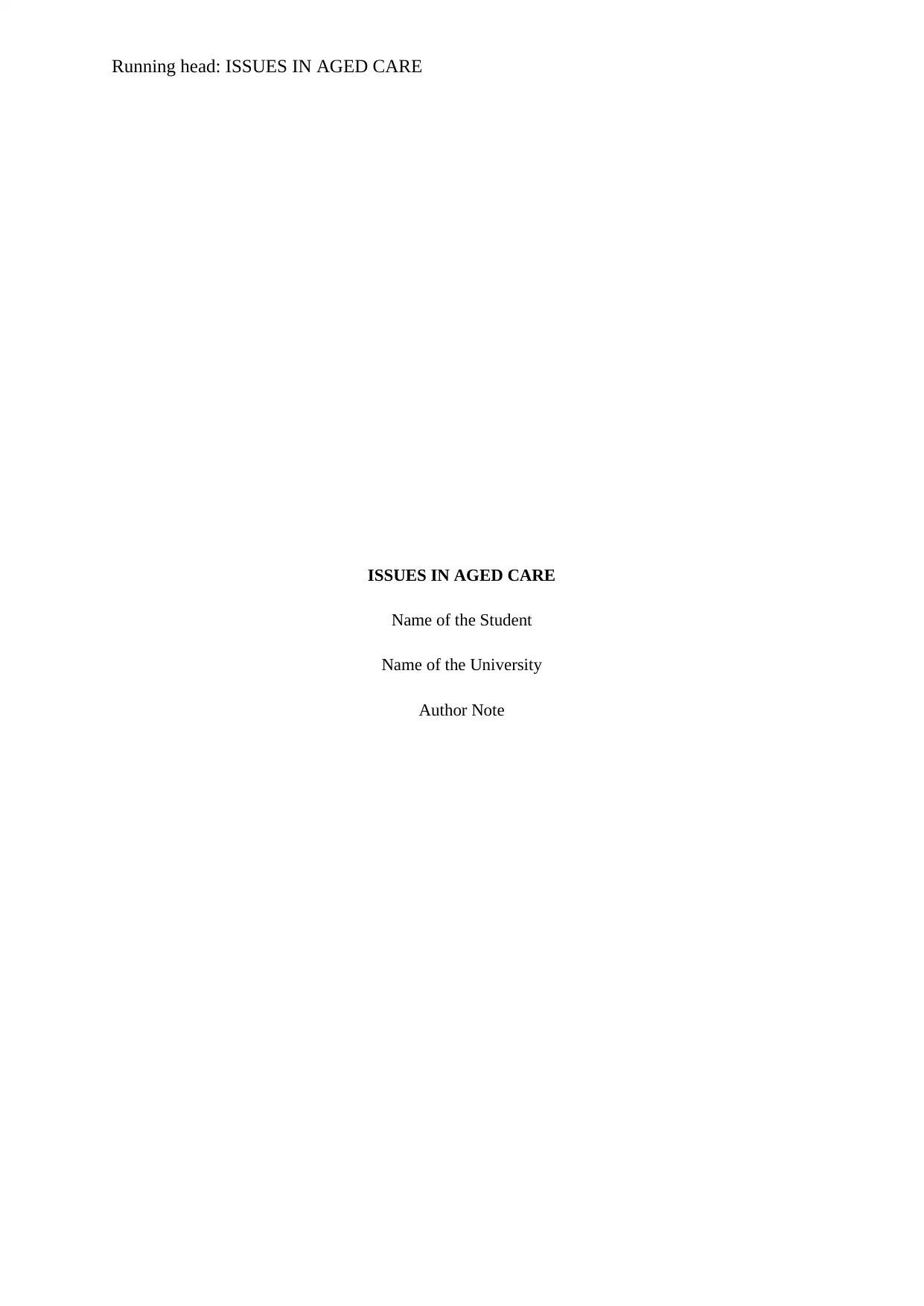
Running head: ISSUES IN AGED CARE
ISSUES IN AGED CARE
Name of the Student
Name of the University
Author Note
ISSUES IN AGED CARE
Name of the Student
Name of the University
Author Note
Paraphrase This Document
Need a fresh take? Get an instant paraphrase of this document with our AI Paraphraser
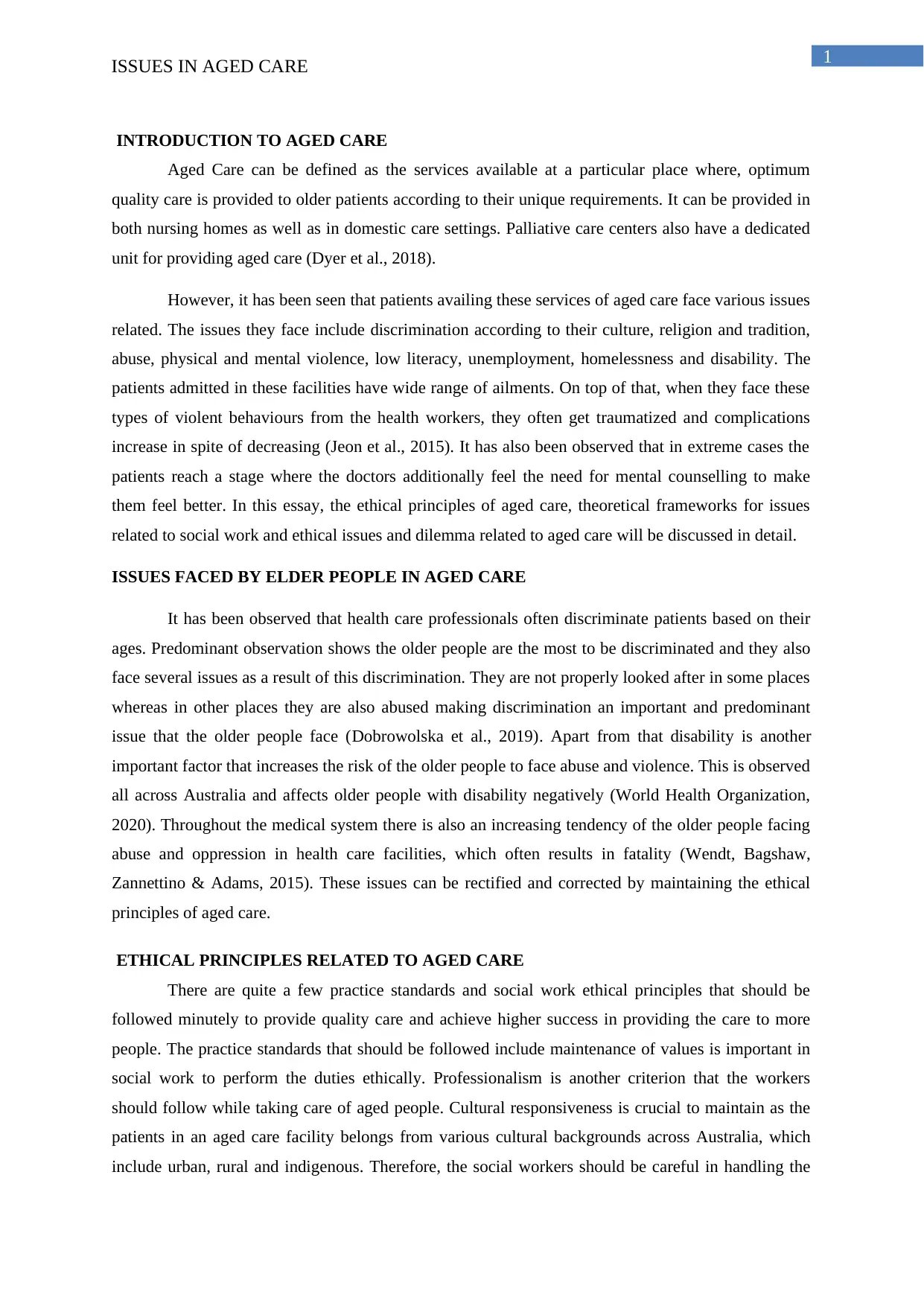
1
ISSUES IN AGED CARE
INTRODUCTION TO AGED CARE
Aged Care can be defined as the services available at a particular place where, optimum
quality care is provided to older patients according to their unique requirements. It can be provided in
both nursing homes as well as in domestic care settings. Palliative care centers also have a dedicated
unit for providing aged care (Dyer et al., 2018).
However, it has been seen that patients availing these services of aged care face various issues
related. The issues they face include discrimination according to their culture, religion and tradition,
abuse, physical and mental violence, low literacy, unemployment, homelessness and disability. The
patients admitted in these facilities have wide range of ailments. On top of that, when they face these
types of violent behaviours from the health workers, they often get traumatized and complications
increase in spite of decreasing (Jeon et al., 2015). It has also been observed that in extreme cases the
patients reach a stage where the doctors additionally feel the need for mental counselling to make
them feel better. In this essay, the ethical principles of aged care, theoretical frameworks for issues
related to social work and ethical issues and dilemma related to aged care will be discussed in detail.
ISSUES FACED BY ELDER PEOPLE IN AGED CARE
It has been observed that health care professionals often discriminate patients based on their
ages. Predominant observation shows the older people are the most to be discriminated and they also
face several issues as a result of this discrimination. They are not properly looked after in some places
whereas in other places they are also abused making discrimination an important and predominant
issue that the older people face (Dobrowolska et al., 2019). Apart from that disability is another
important factor that increases the risk of the older people to face abuse and violence. This is observed
all across Australia and affects older people with disability negatively (World Health Organization,
2020). Throughout the medical system there is also an increasing tendency of the older people facing
abuse and oppression in health care facilities, which often results in fatality (Wendt, Bagshaw,
Zannettino & Adams, 2015). These issues can be rectified and corrected by maintaining the ethical
principles of aged care.
ETHICAL PRINCIPLES RELATED TO AGED CARE
There are quite a few practice standards and social work ethical principles that should be
followed minutely to provide quality care and achieve higher success in providing the care to more
people. The practice standards that should be followed include maintenance of values is important in
social work to perform the duties ethically. Professionalism is another criterion that the workers
should follow while taking care of aged people. Cultural responsiveness is crucial to maintain as the
patients in an aged care facility belongs from various cultural backgrounds across Australia, which
include urban, rural and indigenous. Therefore, the social workers should be careful in handling the
ISSUES IN AGED CARE
INTRODUCTION TO AGED CARE
Aged Care can be defined as the services available at a particular place where, optimum
quality care is provided to older patients according to their unique requirements. It can be provided in
both nursing homes as well as in domestic care settings. Palliative care centers also have a dedicated
unit for providing aged care (Dyer et al., 2018).
However, it has been seen that patients availing these services of aged care face various issues
related. The issues they face include discrimination according to their culture, religion and tradition,
abuse, physical and mental violence, low literacy, unemployment, homelessness and disability. The
patients admitted in these facilities have wide range of ailments. On top of that, when they face these
types of violent behaviours from the health workers, they often get traumatized and complications
increase in spite of decreasing (Jeon et al., 2015). It has also been observed that in extreme cases the
patients reach a stage where the doctors additionally feel the need for mental counselling to make
them feel better. In this essay, the ethical principles of aged care, theoretical frameworks for issues
related to social work and ethical issues and dilemma related to aged care will be discussed in detail.
ISSUES FACED BY ELDER PEOPLE IN AGED CARE
It has been observed that health care professionals often discriminate patients based on their
ages. Predominant observation shows the older people are the most to be discriminated and they also
face several issues as a result of this discrimination. They are not properly looked after in some places
whereas in other places they are also abused making discrimination an important and predominant
issue that the older people face (Dobrowolska et al., 2019). Apart from that disability is another
important factor that increases the risk of the older people to face abuse and violence. This is observed
all across Australia and affects older people with disability negatively (World Health Organization,
2020). Throughout the medical system there is also an increasing tendency of the older people facing
abuse and oppression in health care facilities, which often results in fatality (Wendt, Bagshaw,
Zannettino & Adams, 2015). These issues can be rectified and corrected by maintaining the ethical
principles of aged care.
ETHICAL PRINCIPLES RELATED TO AGED CARE
There are quite a few practice standards and social work ethical principles that should be
followed minutely to provide quality care and achieve higher success in providing the care to more
people. The practice standards that should be followed include maintenance of values is important in
social work to perform the duties ethically. Professionalism is another criterion that the workers
should follow while taking care of aged people. Cultural responsiveness is crucial to maintain as the
patients in an aged care facility belongs from various cultural backgrounds across Australia, which
include urban, rural and indigenous. Therefore, the social workers should be careful in handling the
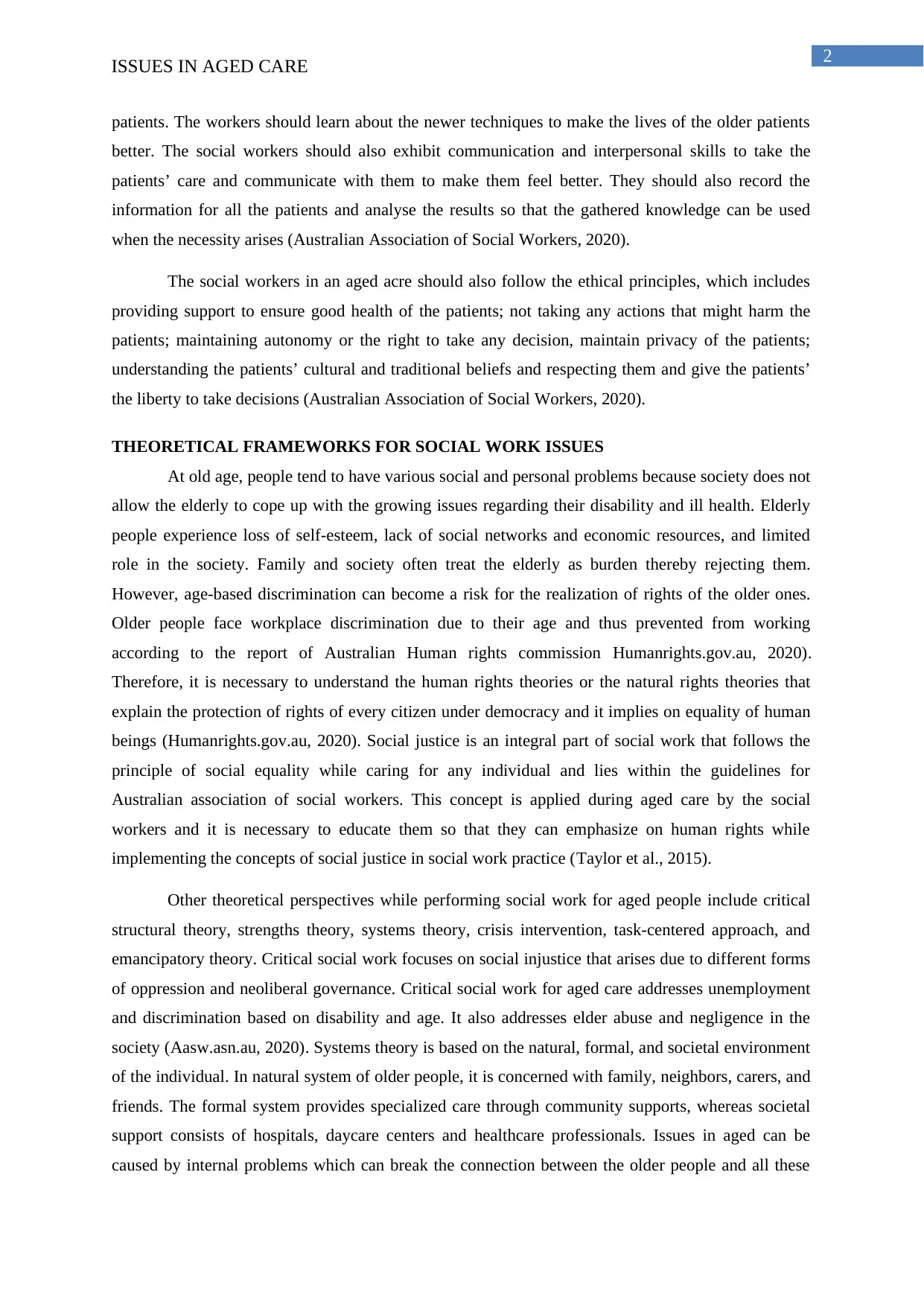
2
ISSUES IN AGED CARE
patients. The workers should learn about the newer techniques to make the lives of the older patients
better. The social workers should also exhibit communication and interpersonal skills to take the
patients’ care and communicate with them to make them feel better. They should also record the
information for all the patients and analyse the results so that the gathered knowledge can be used
when the necessity arises (Australian Association of Social Workers, 2020).
The social workers in an aged acre should also follow the ethical principles, which includes
providing support to ensure good health of the patients; not taking any actions that might harm the
patients; maintaining autonomy or the right to take any decision, maintain privacy of the patients;
understanding the patients’ cultural and traditional beliefs and respecting them and give the patients’
the liberty to take decisions (Australian Association of Social Workers, 2020).
THEORETICAL FRAMEWORKS FOR SOCIAL WORK ISSUES
At old age, people tend to have various social and personal problems because society does not
allow the elderly to cope up with the growing issues regarding their disability and ill health. Elderly
people experience loss of self-esteem, lack of social networks and economic resources, and limited
role in the society. Family and society often treat the elderly as burden thereby rejecting them.
However, age-based discrimination can become a risk for the realization of rights of the older ones.
Older people face workplace discrimination due to their age and thus prevented from working
according to the report of Australian Human rights commission Humanrights.gov.au, 2020).
Therefore, it is necessary to understand the human rights theories or the natural rights theories that
explain the protection of rights of every citizen under democracy and it implies on equality of human
beings (Humanrights.gov.au, 2020). Social justice is an integral part of social work that follows the
principle of social equality while caring for any individual and lies within the guidelines for
Australian association of social workers. This concept is applied during aged care by the social
workers and it is necessary to educate them so that they can emphasize on human rights while
implementing the concepts of social justice in social work practice (Taylor et al., 2015).
Other theoretical perspectives while performing social work for aged people include critical
structural theory, strengths theory, systems theory, crisis intervention, task-centered approach, and
emancipatory theory. Critical social work focuses on social injustice that arises due to different forms
of oppression and neoliberal governance. Critical social work for aged care addresses unemployment
and discrimination based on disability and age. It also addresses elder abuse and negligence in the
society (Aasw.asn.au, 2020). Systems theory is based on the natural, formal, and societal environment
of the individual. In natural system of older people, it is concerned with family, neighbors, carers, and
friends. The formal system provides specialized care through community supports, whereas societal
support consists of hospitals, daycare centers and healthcare professionals. Issues in aged can be
caused by internal problems which can break the connection between the older people and all these
ISSUES IN AGED CARE
patients. The workers should learn about the newer techniques to make the lives of the older patients
better. The social workers should also exhibit communication and interpersonal skills to take the
patients’ care and communicate with them to make them feel better. They should also record the
information for all the patients and analyse the results so that the gathered knowledge can be used
when the necessity arises (Australian Association of Social Workers, 2020).
The social workers in an aged acre should also follow the ethical principles, which includes
providing support to ensure good health of the patients; not taking any actions that might harm the
patients; maintaining autonomy or the right to take any decision, maintain privacy of the patients;
understanding the patients’ cultural and traditional beliefs and respecting them and give the patients’
the liberty to take decisions (Australian Association of Social Workers, 2020).
THEORETICAL FRAMEWORKS FOR SOCIAL WORK ISSUES
At old age, people tend to have various social and personal problems because society does not
allow the elderly to cope up with the growing issues regarding their disability and ill health. Elderly
people experience loss of self-esteem, lack of social networks and economic resources, and limited
role in the society. Family and society often treat the elderly as burden thereby rejecting them.
However, age-based discrimination can become a risk for the realization of rights of the older ones.
Older people face workplace discrimination due to their age and thus prevented from working
according to the report of Australian Human rights commission Humanrights.gov.au, 2020).
Therefore, it is necessary to understand the human rights theories or the natural rights theories that
explain the protection of rights of every citizen under democracy and it implies on equality of human
beings (Humanrights.gov.au, 2020). Social justice is an integral part of social work that follows the
principle of social equality while caring for any individual and lies within the guidelines for
Australian association of social workers. This concept is applied during aged care by the social
workers and it is necessary to educate them so that they can emphasize on human rights while
implementing the concepts of social justice in social work practice (Taylor et al., 2015).
Other theoretical perspectives while performing social work for aged people include critical
structural theory, strengths theory, systems theory, crisis intervention, task-centered approach, and
emancipatory theory. Critical social work focuses on social injustice that arises due to different forms
of oppression and neoliberal governance. Critical social work for aged care addresses unemployment
and discrimination based on disability and age. It also addresses elder abuse and negligence in the
society (Aasw.asn.au, 2020). Systems theory is based on the natural, formal, and societal environment
of the individual. In natural system of older people, it is concerned with family, neighbors, carers, and
friends. The formal system provides specialized care through community supports, whereas societal
support consists of hospitals, daycare centers and healthcare professionals. Issues in aged can be
caused by internal problems which can break the connection between the older people and all these
You're viewing a preview
Unlock full access by subscribing today!
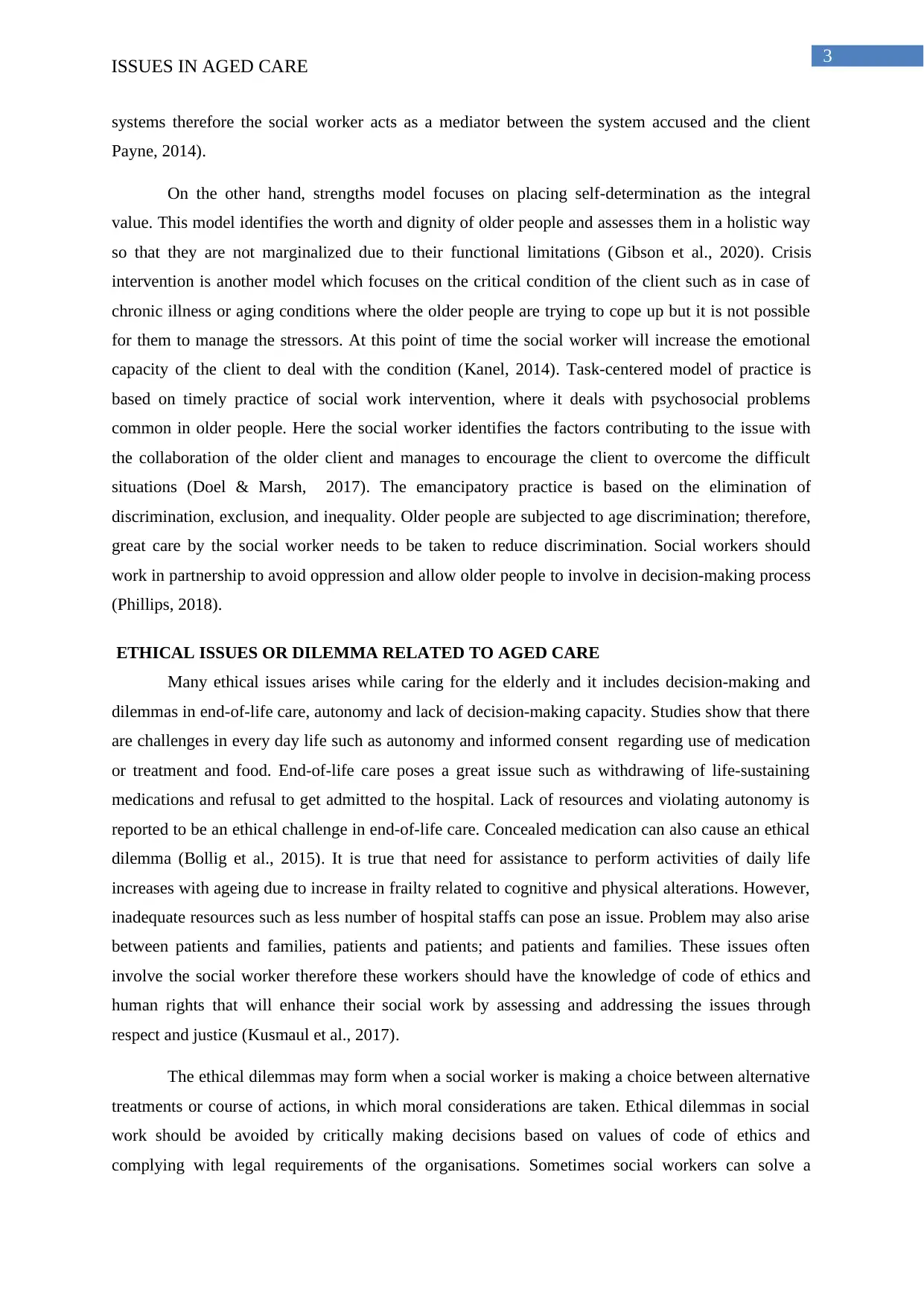
3
ISSUES IN AGED CARE
systems therefore the social worker acts as a mediator between the system accused and the client
Payne, 2014).
On the other hand, strengths model focuses on placing self-determination as the integral
value. This model identifies the worth and dignity of older people and assesses them in a holistic way
so that they are not marginalized due to their functional limitations (Gibson et al., 2020). Crisis
intervention is another model which focuses on the critical condition of the client such as in case of
chronic illness or aging conditions where the older people are trying to cope up but it is not possible
for them to manage the stressors. At this point of time the social worker will increase the emotional
capacity of the client to deal with the condition (Kanel, 2014). Task-centered model of practice is
based on timely practice of social work intervention, where it deals with psychosocial problems
common in older people. Here the social worker identifies the factors contributing to the issue with
the collaboration of the older client and manages to encourage the client to overcome the difficult
situations (Doel & Marsh, 2017). The emancipatory practice is based on the elimination of
discrimination, exclusion, and inequality. Older people are subjected to age discrimination; therefore,
great care by the social worker needs to be taken to reduce discrimination. Social workers should
work in partnership to avoid oppression and allow older people to involve in decision-making process
(Phillips, 2018).
ETHICAL ISSUES OR DILEMMA RELATED TO AGED CARE
Many ethical issues arises while caring for the elderly and it includes decision-making and
dilemmas in end-of-life care, autonomy and lack of decision-making capacity. Studies show that there
are challenges in every day life such as autonomy and informed consent regarding use of medication
or treatment and food. End-of-life care poses a great issue such as withdrawing of life-sustaining
medications and refusal to get admitted to the hospital. Lack of resources and violating autonomy is
reported to be an ethical challenge in end-of-life care. Concealed medication can also cause an ethical
dilemma (Bollig et al., 2015). It is true that need for assistance to perform activities of daily life
increases with ageing due to increase in frailty related to cognitive and physical alterations. However,
inadequate resources such as less number of hospital staffs can pose an issue. Problem may also arise
between patients and families, patients and patients; and patients and families. These issues often
involve the social worker therefore these workers should have the knowledge of code of ethics and
human rights that will enhance their social work by assessing and addressing the issues through
respect and justice (Kusmaul et al., 2017).
The ethical dilemmas may form when a social worker is making a choice between alternative
treatments or course of actions, in which moral considerations are taken. Ethical dilemmas in social
work should be avoided by critically making decisions based on values of code of ethics and
complying with legal requirements of the organisations. Sometimes social workers can solve a
ISSUES IN AGED CARE
systems therefore the social worker acts as a mediator between the system accused and the client
Payne, 2014).
On the other hand, strengths model focuses on placing self-determination as the integral
value. This model identifies the worth and dignity of older people and assesses them in a holistic way
so that they are not marginalized due to their functional limitations (Gibson et al., 2020). Crisis
intervention is another model which focuses on the critical condition of the client such as in case of
chronic illness or aging conditions where the older people are trying to cope up but it is not possible
for them to manage the stressors. At this point of time the social worker will increase the emotional
capacity of the client to deal with the condition (Kanel, 2014). Task-centered model of practice is
based on timely practice of social work intervention, where it deals with psychosocial problems
common in older people. Here the social worker identifies the factors contributing to the issue with
the collaboration of the older client and manages to encourage the client to overcome the difficult
situations (Doel & Marsh, 2017). The emancipatory practice is based on the elimination of
discrimination, exclusion, and inequality. Older people are subjected to age discrimination; therefore,
great care by the social worker needs to be taken to reduce discrimination. Social workers should
work in partnership to avoid oppression and allow older people to involve in decision-making process
(Phillips, 2018).
ETHICAL ISSUES OR DILEMMA RELATED TO AGED CARE
Many ethical issues arises while caring for the elderly and it includes decision-making and
dilemmas in end-of-life care, autonomy and lack of decision-making capacity. Studies show that there
are challenges in every day life such as autonomy and informed consent regarding use of medication
or treatment and food. End-of-life care poses a great issue such as withdrawing of life-sustaining
medications and refusal to get admitted to the hospital. Lack of resources and violating autonomy is
reported to be an ethical challenge in end-of-life care. Concealed medication can also cause an ethical
dilemma (Bollig et al., 2015). It is true that need for assistance to perform activities of daily life
increases with ageing due to increase in frailty related to cognitive and physical alterations. However,
inadequate resources such as less number of hospital staffs can pose an issue. Problem may also arise
between patients and families, patients and patients; and patients and families. These issues often
involve the social worker therefore these workers should have the knowledge of code of ethics and
human rights that will enhance their social work by assessing and addressing the issues through
respect and justice (Kusmaul et al., 2017).
The ethical dilemmas may form when a social worker is making a choice between alternative
treatments or course of actions, in which moral considerations are taken. Ethical dilemmas in social
work should be avoided by critically making decisions based on values of code of ethics and
complying with legal requirements of the organisations. Sometimes social workers can solve a
Paraphrase This Document
Need a fresh take? Get an instant paraphrase of this document with our AI Paraphraser
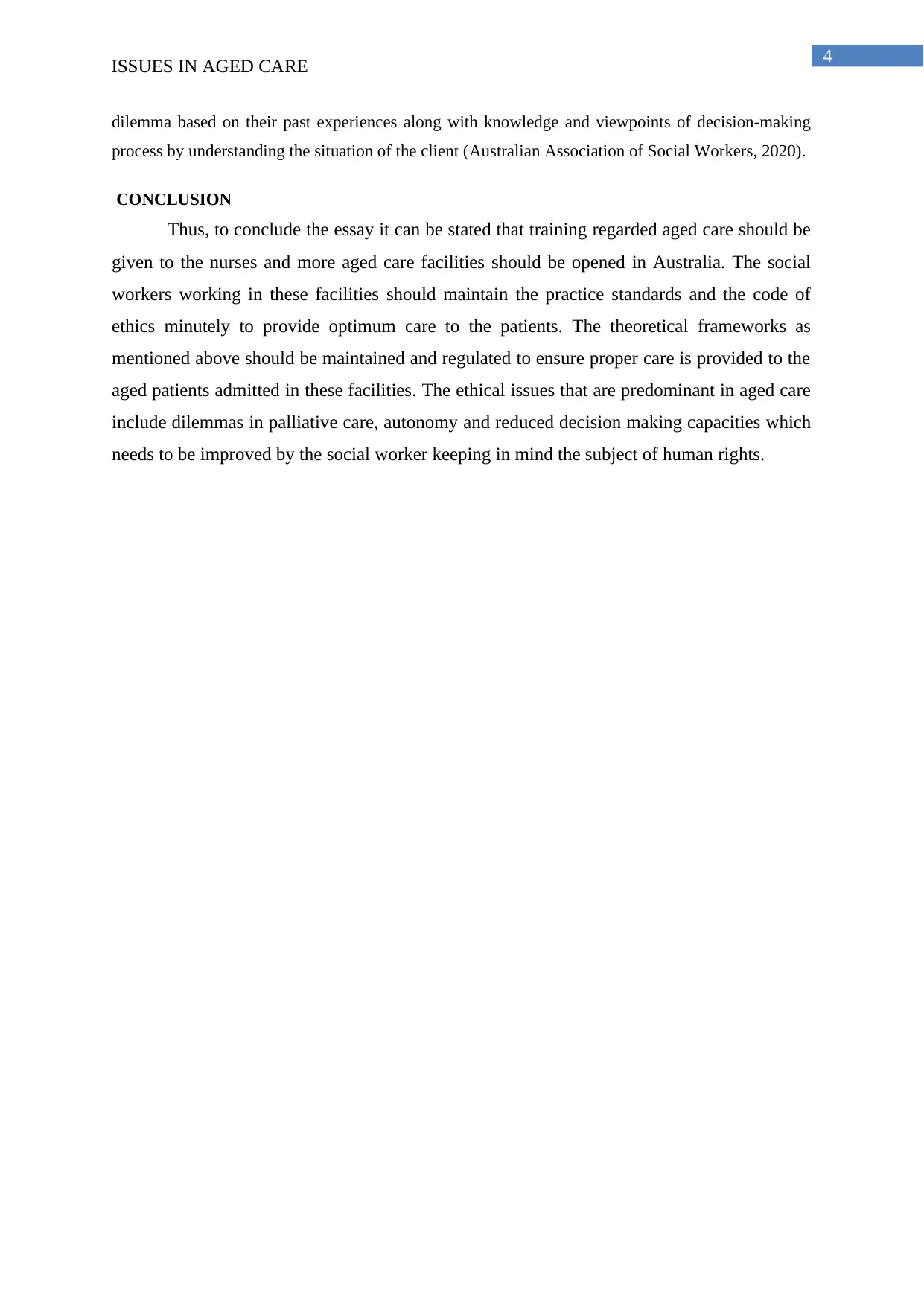
4
ISSUES IN AGED CARE
dilemma based on their past experiences along with knowledge and viewpoints of decision-making
process by understanding the situation of the client (Australian Association of Social Workers, 2020).
CONCLUSION
Thus, to conclude the essay it can be stated that training regarded aged care should be
given to the nurses and more aged care facilities should be opened in Australia. The social
workers working in these facilities should maintain the practice standards and the code of
ethics minutely to provide optimum care to the patients. The theoretical frameworks as
mentioned above should be maintained and regulated to ensure proper care is provided to the
aged patients admitted in these facilities. The ethical issues that are predominant in aged care
include dilemmas in palliative care, autonomy and reduced decision making capacities which
needs to be improved by the social worker keeping in mind the subject of human rights.
ISSUES IN AGED CARE
dilemma based on their past experiences along with knowledge and viewpoints of decision-making
process by understanding the situation of the client (Australian Association of Social Workers, 2020).
CONCLUSION
Thus, to conclude the essay it can be stated that training regarded aged care should be
given to the nurses and more aged care facilities should be opened in Australia. The social
workers working in these facilities should maintain the practice standards and the code of
ethics minutely to provide optimum care to the patients. The theoretical frameworks as
mentioned above should be maintained and regulated to ensure proper care is provided to the
aged patients admitted in these facilities. The ethical issues that are predominant in aged care
include dilemmas in palliative care, autonomy and reduced decision making capacities which
needs to be improved by the social worker keeping in mind the subject of human rights.
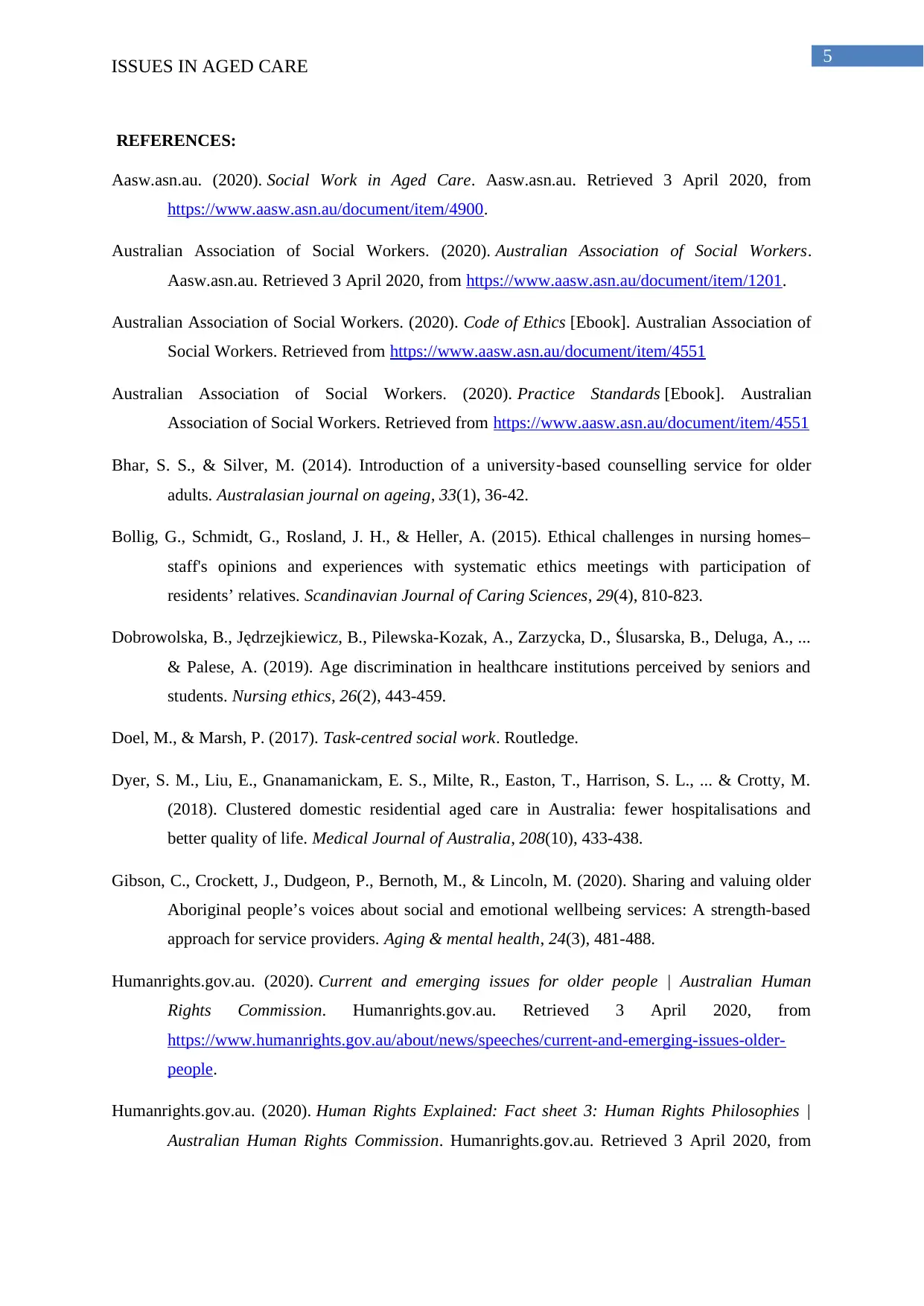
5
ISSUES IN AGED CARE
REFERENCES:
Aasw.asn.au. (2020). Social Work in Aged Care. Aasw.asn.au. Retrieved 3 April 2020, from
https://www.aasw.asn.au/document/item/4900.
Australian Association of Social Workers. (2020). Australian Association of Social Workers.
Aasw.asn.au. Retrieved 3 April 2020, from https://www.aasw.asn.au/document/item/1201.
Australian Association of Social Workers. (2020). Code of Ethics [Ebook]. Australian Association of
Social Workers. Retrieved from https://www.aasw.asn.au/document/item/4551
Australian Association of Social Workers. (2020). Practice Standards [Ebook]. Australian
Association of Social Workers. Retrieved from https://www.aasw.asn.au/document/item/4551
Bhar, S. S., & Silver, M. (2014). Introduction of a university‐based counselling service for older
adults. Australasian journal on ageing, 33(1), 36-42.
Bollig, G., Schmidt, G., Rosland, J. H., & Heller, A. (2015). Ethical challenges in nursing homes–
staff's opinions and experiences with systematic ethics meetings with participation of
residents’ relatives. Scandinavian Journal of Caring Sciences, 29(4), 810-823.
Dobrowolska, B., Jędrzejkiewicz, B., Pilewska-Kozak, A., Zarzycka, D., Ślusarska, B., Deluga, A., ...
& Palese, A. (2019). Age discrimination in healthcare institutions perceived by seniors and
students. Nursing ethics, 26(2), 443-459.
Doel, M., & Marsh, P. (2017). Task-centred social work. Routledge.
Dyer, S. M., Liu, E., Gnanamanickam, E. S., Milte, R., Easton, T., Harrison, S. L., ... & Crotty, M.
(2018). Clustered domestic residential aged care in Australia: fewer hospitalisations and
better quality of life. Medical Journal of Australia, 208(10), 433-438.
Gibson, C., Crockett, J., Dudgeon, P., Bernoth, M., & Lincoln, M. (2020). Sharing and valuing older
Aboriginal people’s voices about social and emotional wellbeing services: A strength-based
approach for service providers. Aging & mental health, 24(3), 481-488.
Humanrights.gov.au. (2020). Current and emerging issues for older people | Australian Human
Rights Commission. Humanrights.gov.au. Retrieved 3 April 2020, from
https://www.humanrights.gov.au/about/news/speeches/current-and-emerging-issues-older-
people.
Humanrights.gov.au. (2020). Human Rights Explained: Fact sheet 3: Human Rights Philosophies |
Australian Human Rights Commission. Humanrights.gov.au. Retrieved 3 April 2020, from
ISSUES IN AGED CARE
REFERENCES:
Aasw.asn.au. (2020). Social Work in Aged Care. Aasw.asn.au. Retrieved 3 April 2020, from
https://www.aasw.asn.au/document/item/4900.
Australian Association of Social Workers. (2020). Australian Association of Social Workers.
Aasw.asn.au. Retrieved 3 April 2020, from https://www.aasw.asn.au/document/item/1201.
Australian Association of Social Workers. (2020). Code of Ethics [Ebook]. Australian Association of
Social Workers. Retrieved from https://www.aasw.asn.au/document/item/4551
Australian Association of Social Workers. (2020). Practice Standards [Ebook]. Australian
Association of Social Workers. Retrieved from https://www.aasw.asn.au/document/item/4551
Bhar, S. S., & Silver, M. (2014). Introduction of a university‐based counselling service for older
adults. Australasian journal on ageing, 33(1), 36-42.
Bollig, G., Schmidt, G., Rosland, J. H., & Heller, A. (2015). Ethical challenges in nursing homes–
staff's opinions and experiences with systematic ethics meetings with participation of
residents’ relatives. Scandinavian Journal of Caring Sciences, 29(4), 810-823.
Dobrowolska, B., Jędrzejkiewicz, B., Pilewska-Kozak, A., Zarzycka, D., Ślusarska, B., Deluga, A., ...
& Palese, A. (2019). Age discrimination in healthcare institutions perceived by seniors and
students. Nursing ethics, 26(2), 443-459.
Doel, M., & Marsh, P. (2017). Task-centred social work. Routledge.
Dyer, S. M., Liu, E., Gnanamanickam, E. S., Milte, R., Easton, T., Harrison, S. L., ... & Crotty, M.
(2018). Clustered domestic residential aged care in Australia: fewer hospitalisations and
better quality of life. Medical Journal of Australia, 208(10), 433-438.
Gibson, C., Crockett, J., Dudgeon, P., Bernoth, M., & Lincoln, M. (2020). Sharing and valuing older
Aboriginal people’s voices about social and emotional wellbeing services: A strength-based
approach for service providers. Aging & mental health, 24(3), 481-488.
Humanrights.gov.au. (2020). Current and emerging issues for older people | Australian Human
Rights Commission. Humanrights.gov.au. Retrieved 3 April 2020, from
https://www.humanrights.gov.au/about/news/speeches/current-and-emerging-issues-older-
people.
Humanrights.gov.au. (2020). Human Rights Explained: Fact sheet 3: Human Rights Philosophies |
Australian Human Rights Commission. Humanrights.gov.au. Retrieved 3 April 2020, from
You're viewing a preview
Unlock full access by subscribing today!
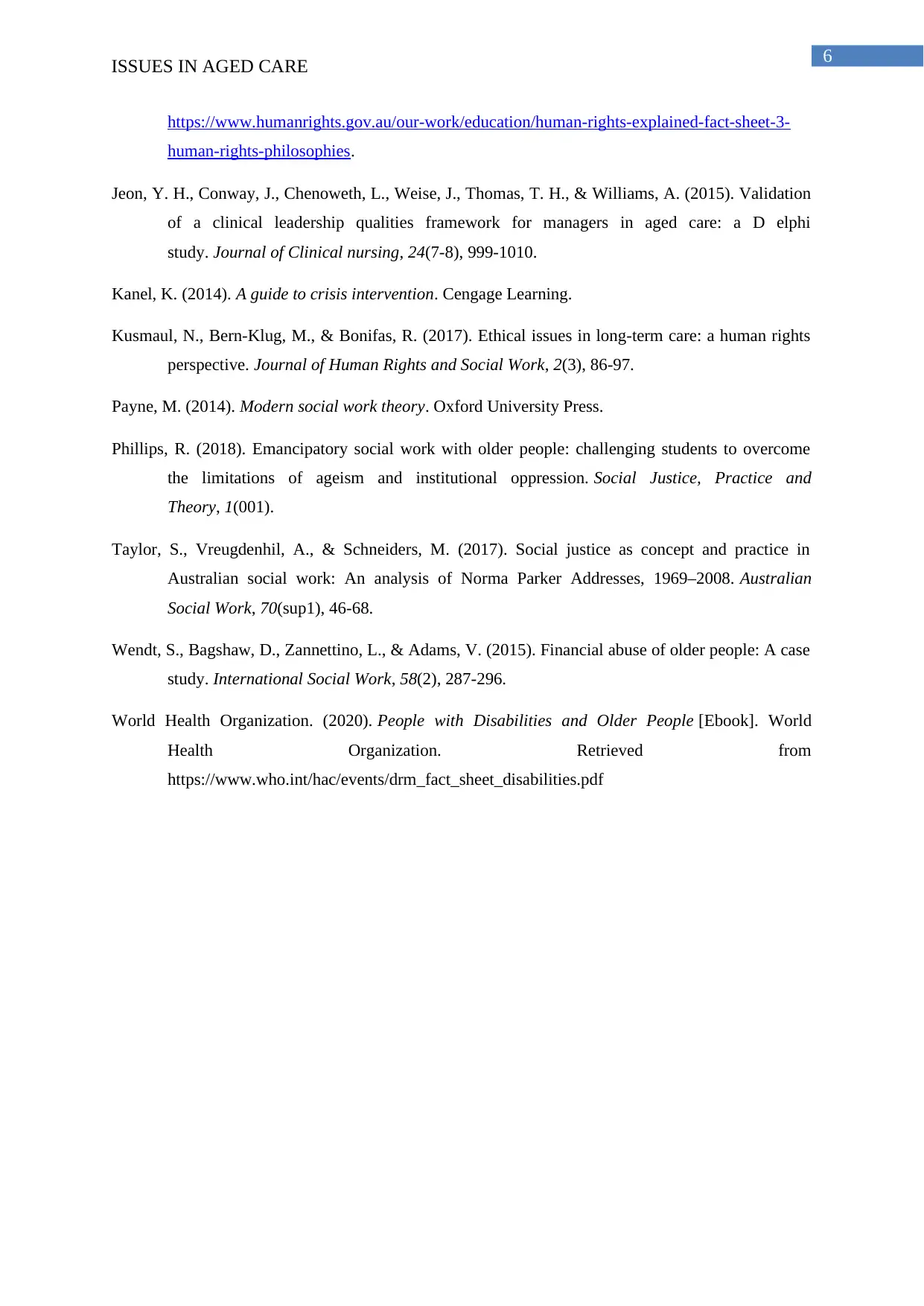
6
ISSUES IN AGED CARE
https://www.humanrights.gov.au/our-work/education/human-rights-explained-fact-sheet-3-
human-rights-philosophies.
Jeon, Y. H., Conway, J., Chenoweth, L., Weise, J., Thomas, T. H., & Williams, A. (2015). Validation
of a clinical leadership qualities framework for managers in aged care: a D elphi
study. Journal of Clinical nursing, 24(7-8), 999-1010.
Kanel, K. (2014). A guide to crisis intervention. Cengage Learning.
Kusmaul, N., Bern-Klug, M., & Bonifas, R. (2017). Ethical issues in long-term care: a human rights
perspective. Journal of Human Rights and Social Work, 2(3), 86-97.
Payne, M. (2014). Modern social work theory. Oxford University Press.
Phillips, R. (2018). Emancipatory social work with older people: challenging students to overcome
the limitations of ageism and institutional oppression. Social Justice, Practice and
Theory, 1(001).
Taylor, S., Vreugdenhil, A., & Schneiders, M. (2017). Social justice as concept and practice in
Australian social work: An analysis of Norma Parker Addresses, 1969–2008. Australian
Social Work, 70(sup1), 46-68.
Wendt, S., Bagshaw, D., Zannettino, L., & Adams, V. (2015). Financial abuse of older people: A case
study. International Social Work, 58(2), 287-296.
World Health Organization. (2020). People with Disabilities and Older People [Ebook]. World
Health Organization. Retrieved from
https://www.who.int/hac/events/drm_fact_sheet_disabilities.pdf
ISSUES IN AGED CARE
https://www.humanrights.gov.au/our-work/education/human-rights-explained-fact-sheet-3-
human-rights-philosophies.
Jeon, Y. H., Conway, J., Chenoweth, L., Weise, J., Thomas, T. H., & Williams, A. (2015). Validation
of a clinical leadership qualities framework for managers in aged care: a D elphi
study. Journal of Clinical nursing, 24(7-8), 999-1010.
Kanel, K. (2014). A guide to crisis intervention. Cengage Learning.
Kusmaul, N., Bern-Klug, M., & Bonifas, R. (2017). Ethical issues in long-term care: a human rights
perspective. Journal of Human Rights and Social Work, 2(3), 86-97.
Payne, M. (2014). Modern social work theory. Oxford University Press.
Phillips, R. (2018). Emancipatory social work with older people: challenging students to overcome
the limitations of ageism and institutional oppression. Social Justice, Practice and
Theory, 1(001).
Taylor, S., Vreugdenhil, A., & Schneiders, M. (2017). Social justice as concept and practice in
Australian social work: An analysis of Norma Parker Addresses, 1969–2008. Australian
Social Work, 70(sup1), 46-68.
Wendt, S., Bagshaw, D., Zannettino, L., & Adams, V. (2015). Financial abuse of older people: A case
study. International Social Work, 58(2), 287-296.
World Health Organization. (2020). People with Disabilities and Older People [Ebook]. World
Health Organization. Retrieved from
https://www.who.int/hac/events/drm_fact_sheet_disabilities.pdf
1 out of 7
Related Documents
Your All-in-One AI-Powered Toolkit for Academic Success.
+13062052269
info@desklib.com
Available 24*7 on WhatsApp / Email
![[object Object]](/_next/static/media/star-bottom.7253800d.svg)
Unlock your academic potential
© 2024 | Zucol Services PVT LTD | All rights reserved.

![Issues and Laws: Protecting the Aged in Australia - [University Name]](/_next/image/?url=https%3A%2F%2Fdesklib.com%2Fmedia%2Fimages%2Fds%2Fbcb4fe90bf704423a050f4e10fe3b7cc.jpg&w=256&q=75)



